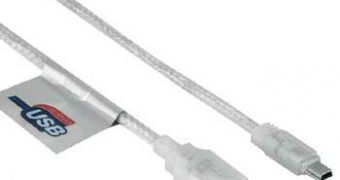It looks like the days of glory for USB 2.0 and FireWire B are coming to an end as Intel Corporation and a number of other major computer hardware manufacturing companies are pushing ahead a new standard for connecting devices to a host computer system, the USB 3.0. This new interconnect standard should offer a huge speed advantage over the current USB and FireWire implementations, while keeping and expanding the wide availability of the existing standard.
Those important computer manufacturing companies established the USB 3.0 Promoter Group in order to create and supervise the emerging standard that should offer, at least in theory, a 10 times speed boost over the USB 2.0. This new technology is developed as a joint effort by Intel, HP, Microsoft Corporation, NEC Corporation, NXP Semiconductors and Texas Instruments Incorporated in an attempt to reduce waiting times when talking about the sync-and-go transfer applications between a portable electronic device and a personal computer.
As one of the most important features of a standard in the hardware market is its backward compatibility with its previous versions, the USB version 3.0 will also support all USB 2.0 enabled devices while making good use of the plug and play capabilities of previous USB technologies. Apart from the great speed increase, the third iteration of the USB standard will offer some file transfer optimizations and increased protocol efficiency as well as the possibility to work with lower energy consumption.
"USB 3.0 is the next logical step for the PC's most popular wired connectivity," said Jeff Ravencraft, technology strategist with Intel and president of the USB Implementers Forum (USB-IF). "The digital era requires high-speed performance and reliable connectivity to move the enormous amounts of digital content now present in everyday life. USB 3.0 will meet this challenge while maintaining the ease-of-use experience that users have come to love and expect from any USB technology."
Intel supported the USB 3.0 Promoter Group as the industry needs soon the technical specifications of the new standard and a first version of those specifications is expected to become available sometimes during the first half of the next year.
In order to gain as much acceptance as possible for the new standard, the USB 3.0 Promoter Group will preserve the current USB device architecture's most important features, such as look-and-feel and ease-of-use while improving the general performance of the protocol.
''USB 3.0 is the next logical step for the PC's most popular wired connectivity. The digital era requires high-speed performance and reliable connectivity to move the enormous amounts of digital content now present in everyday life. USB 3.0 will meet this challenge while maintaining the ease-of-use experience that users have come to love and expect from any USB technology,'' said Jeff Ravencraft, technology strategist with Intel and president of the USB Implementers Forum (USB-IF for short), who was cited by the news site xbitlabs.

 14 DAY TRIAL //
14 DAY TRIAL //